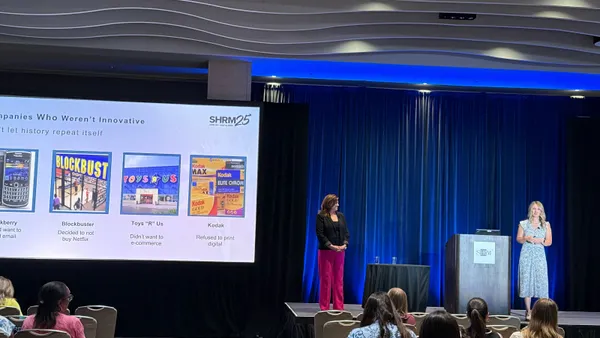Dive Brief:
- Cosmetics retailer The Body Shop will implement an "open hiring" model for customer consultant positions at its U.S. retail stores this summer, the company's U.S. general manager, Andrea Blieden, told HR Dive in an email statement Feb. 14.
- Under the model, job openings will be filled on a first-come, first-served basis by any applicant who meets basic requirements. The Body Shop will not conduct a background check or drug screening, but will ask candidates whether they are authorized to work in the U.S., can lift over 50 pounds and stand for up to eight hours.
- The company is using a technique first implemented by the Greyston organization, which has used the model to fill positions at its bakery business since 1982. The Body Shop worked with Greyston to establish a pilot program for open hiring before deciding to expand its use of the model, Blieden said.
Dive Insight:
As the U.S. labor market continues its run of low unemployment, employers including The Body Shop have turned to talent pools and channels that traditionally may have been overlooked.
One such pool is the formerly incarcerated population. According to a 2017 study from the Population Association of America, a non-profit academic association, an estimated 4.9 million Americans were formerly incarcerated. Add in the estimated 70 million U.S. adults with a criminal record — which does not necessarily imply conviction — and that's an even larger pool.
"The Body Shop is one of the original global activist brands," Blieden said. "Because of this, we aren't just implementing our open hiring model out of a need to hire more people, but rather because we are concerned about the level of inequality and exclusion in society and we want to set an example for other brands on how to be fairer."
Greyston Bakery's open hiring policy was presented as a potential model for employers to consider when hiring formerly incarcerated persons during a U.S. Chamber of Commerce Foundation event in June 2019. Other panelists at the event talked about the need to overcome biases and resistance on the part of current employees to implement such hiring practices.
State and local legislatures are working to reduce bias against formerly incarcerated individuals by implementing "ban the box" laws that prohibit employers from inquiring about criminal history on employment applications. One of the most recent examples is Maryland, where the state's legislature overrode a veto by the governor in late January.
Despite resistance by some employers, the movement is picking up some support among prominent HR groups and organizations. Last year, the Society for Human Resource Management (SHRM) launched a national hiring pledge focused on hiring formerly incarcerated individuals, in partnership with entities like Koch Industries and the National Restaurant Association. At the time of the announcement, SHRM president and CEO Johnny C. Taylor called hiring from this talent pool "imperative as businesses continue to experience recruiting difficulty at an alarming rate."
Employers looking to hire formerly incarcerated workers may consider voluntarily "banning the box," which is one of the tactics adopted by some employers. Additional options include staffing agencies that can connect employers with this population while administering processes like background checks. For example, 70 Million Jobs, formerly a job board for formerly incarcerated individuals, shifted to a staffing agency model last year.












